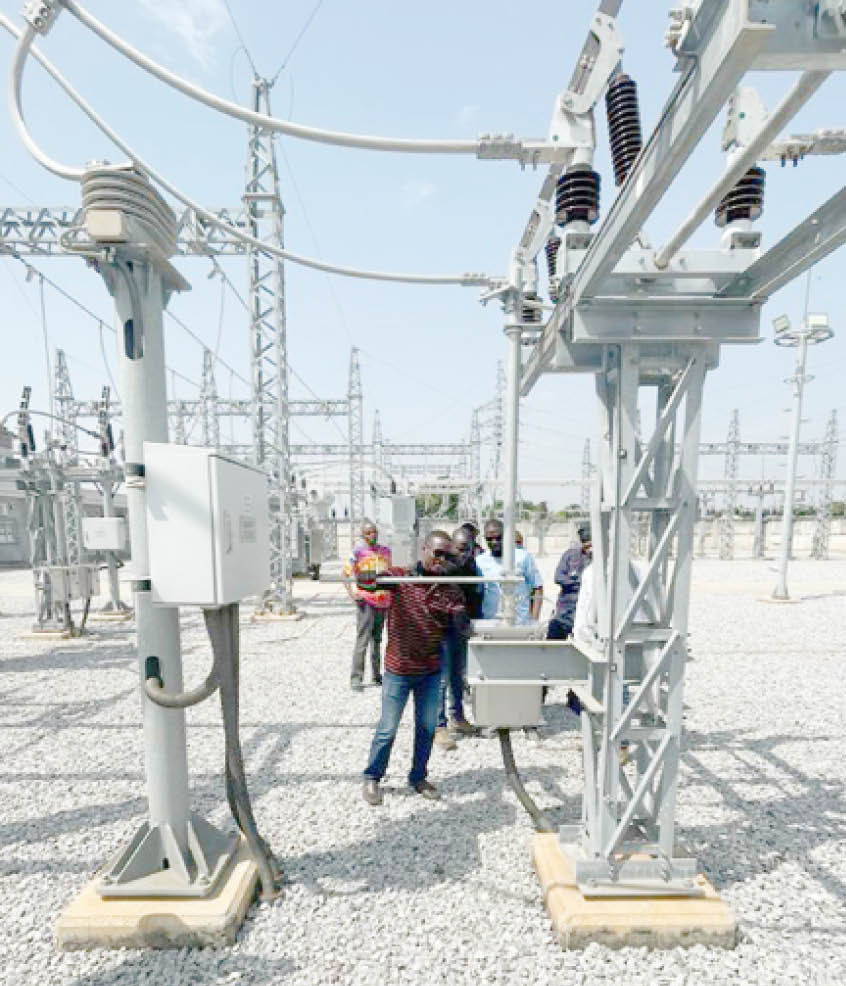Declare emergency in power sector
On Sunday, Nigeria’s national electricity grid collapsed again, the fourth time this year. Uncharacteristically, power distributors in Abuja, Kaduna, Lagos and other parts of the country issued statements warning consumers of their inability to receive bulk electricity from the national supply line. While some collapses were not made public because they lasted for a short […]

Power transmission line that supply electricity from Kashinbilla hydro power station to Yendev in Benue State and southern Taraba.
On Sunday, Nigeria’s national electricity grid collapsed again, the fourth time this year. Uncharacteristically, power distributors in Abuja, Kaduna, Lagos and other parts of the country issued statements warning consumers of their inability to receive bulk electricity from the national supply line.
While some collapses were not made public because they lasted for a short period, many others were made public and lasted days in some cases. Whichever way, for the average Nigerian, it has become part of the norm.
- I may be the next Senate President, says candidate who refused to step down for Lawan
- Owo killing: Senate seeks deployment of helicopters to ungoverned areas
According to ESI Africa, Africa’s leading power and energy journal, in the last nine years, Nigeria’s national electricity grid has collapsed more than 200 times, resulting in widespread blackouts.
In sub-Saharan Africa, every one per cent increase in power outages (in terms of hours) has been associated with a 2.86 per cent decrease in Gross Domestic Product (GDP), a loss of about $28 billion in GDP.
This has left Nigerians and businesses reliant on petrol and diesel-powered generators. Indeed, the nation’s homes and its commercial and industrial sectors now rely on these self-generated power sources, which is drawing back the country’s economic growth. Most impacted are the small-scale businesses, including boutiques, cyber cafes, salons, tailoring and grocery shops and are serviced by small-scale petrol generators.
ESI Africa also estimates that these electricity generator sets in Nigeria consume $22 billion worth of fuel yearly.
The World Bank said in February 2021, that lack of reliable power was a significant constraint for citizens and businesses, resulting in annual economic losses estimated at $26.2 billion (N10.1 trillion), which is equivalent to about 2 per cent of GDP. According to the 2020 World Bank Doing Business report, Nigeria’s position at number 171 out of 190 countries in accessing electricity is one of the major constraints for the private sector. The bank added that 85 million Nigerians don’t have access to grid electricity, representing 43 per cent of the country’s population, making it the country with the largest energy access deficit in the world.
Sadly, the Federal Ministry of Power and the power generating and distributing companies now seem to have a template for explaining the reasons. Recurring reasons for failure include low water levels at the hydropower plants, low gas supply at the gas power plants, fire at power generating stations, load rejection and inability of the transmission companies to wheel electricity from generators to distributors, archaic and weak national grid, poor utility performance and theft/vandalisation of grid equipment, faults at power stations, damage to electric transmission lines, substations or other parts of the distribution system, short circuit, cascading failure, fuse or circuit breaker operation.
The grid collapses or the frequent outages mean that Nigerians continue to suffer the failings of the power sector leaders while they indulge in shameless blame games. Clearly, they are not showing any seriousness in finding a lasting solution to the sector’s perennial problems.
What is disheartening is that Nigeria has an installed capacity of just 12,500 megawatts, less than 20 per cent of its electricity needs. What is more depressing is that the nation cannot even generate up to that capacity not to talk of transmitting and effectively distributing the little it generates.
Also, the federal government has shown lack of capacity to implement its policies, regulations and management of operations in the sector, resulting in failure to provide adequate and reliable energy for the people. So, President Muhammadu Buhari should take the lead and declare a state of emergency in the sector. The era of expressing apologies or regrets is over. The president, in implementing the emergency, should summon the Nigerian Electricity Supply Industry (NESI) comprising the Federal Ministry of Power, Nigerian Electricity Regulatory Commission, the 25 Electricity Generation Companies (GenCos), Transmission Company of Nigeria (TCN), Electricity Distribution Companies (DisCos), Nigerian Bulk Electricity Trading Plc, Niger Delta Power Holding Company (NDPHC), Nigerian National Petroleum Company (NNPC), Shell and other stakeholders and give them the marching order to make electricity supply more stable. And then follow this up.
The federal government should also ensure that the Siemen’s project succeeds as a way of tackling this issue in the short-term. It is worthy of note that while our leaders are busy making excuses for grid collapses, Egypt, whose GDP is much less than that of Nigeria, built 14,000MW of electricity for its national grid in three years, by the same Siemens.
Nigeria needs uninterrupted power supply, and urgently too, if the economy is to crawl out of the doldrums. Government should also accelerate the use of renewable and non-renewable sources of energy. Furthermore, government should speed up efforts to decentralise the national grid through mini-grids driven by renewable and non-renewable energy sources like solar photovoltaic and wind turbines
There should be full support for the constitutional amendment to allow state governments to generate and transmit their own electricity, as this will also present opportunities for investors and industries to participate in the Nigerian energy market as they can transmit excess supply to the national grid for distribution.
The present situation is imposing indirect costs on people as citizens and business operators are subjected to stress-induced financial, mental and physical health issues. This is the time to put the welfare of the people first.
